Many people desire to correct their crooked teeth because it affects their smile. Most people desire teeth that are white, straight, and beautiful, giving them a smile to be proud of. When a person’s smile is the first thing others notice, crooked teeth can cause serious self-esteem issues. Fixing crooked teeth is one of the most common dental concerns patients have. Dr. Derek Conover is an expert in treating crooked teeth in Philadelphia, PA, with restorative and cosmetic dental treatments.
Why Should I Correct My Crooked Teeth?
Crooked teeth might seem like they’re only a cosmetic issue, but they can cause serious problems for your oral health and overall well-being. Here’s why straightening crooked teeth in our Philadelphia, PA office is about more than just improving your smile:
Harder to Clean
When teeth are crooked or crowded, it’s much harder to brush and floss properly. Food particles and plaque can get trapped in tight spaces between teeth, making it difficult to clean them thoroughly. Over time, this can lead to a buildup of plaque, which can cause tooth decay and gum disease. If these problems aren’t treated, they can get worse and even lead to tooth loss or damage to the bone that supports your teeth.
Increased Risk of Gum Disease
Gum disease, also called periodontal disease, happens when bacteria in plaque irritate and infect your gums. Crooked teeth make it easier for plaque to build up, which increases your risk of developing gum disease. If left untreated, gum disease can cause your gums to pull away from your teeth, leading to loose teeth or even tooth loss.
Stress on Your Jaw and Joints
Crooked teeth don’t fit together properly when you bite or chew. This can put extra stress on your jaw muscles and the joints that connect your jaw to your skull, called the temporomandibular joints (TMJ). Over time, this stress can lead to temporomandibular joint dysfunction (TMD), a condition that causes pain, clicking, or popping in your jaw.
Invisalign
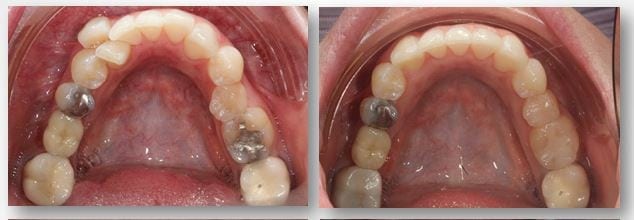
Concerned about crooked teeth, We used Invisalign aligners to straighten Amaya’s smile.
Invisalign uses a series of clear removable aligners to gradually move teeth into proper alignment. They are worn 24 hours a day except when eating, brushing, or flossing. Invisalign clear aligners offer benefits that typical braces do not, including:
- Removable aligners allow you to eat normally without restrictions
- Improved hygiene: you can floss and brush normally
- More comfortable and less noticeable than braces
Crooked Teeth Before and After
Fixing crooked teeth will vastly improve your appearance and how you bite, chew, speak, and clean your teeth. Because many adults don’t want to wear braces, Dr. Conover offers options for fixing crooked teeth without braces:
Porcelain Veneers
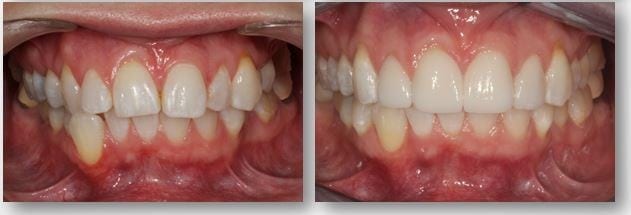
Porcelain veneers are thin, translucent shells that cover the teeth. They are made to look like natural teeth, are removable, and are fairly simple to adhere to. Dental veneers can hide almost any teeth imperfections, including crooked teeth.
Dental Crowns
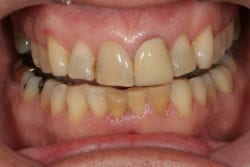
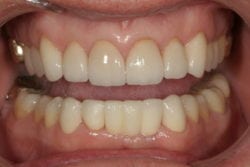
A dental crown is a “cap” that covers the tooth. Crowns can be made of many materials, and porcelain crowns give the tooth a natural look and feel. You can care for dental crowns just like regular teeth with simple brushing and flossing.
Cosmetic Bonding
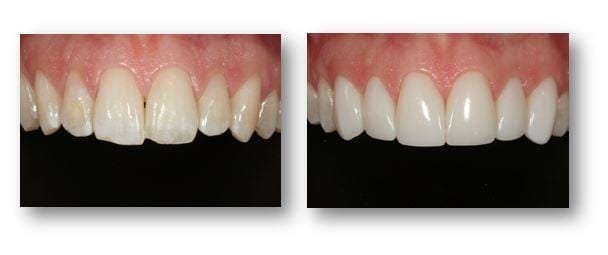
Cosmetic bonding is the easiest and least expensive way to fix crooked teeth. It can close spaces between teeth, make teeth look longer, or change the shape or color of the teeth. Dr. Conover will roughen the existing teeth, lightly coat them with an adhesive liquid, and apply a composite resin to repair them.
Crooked Teeth FAQs
Read answers to common questions about crooked teeth in Philadelphia, PA:
How long does it take for crooked teeth to straighten?
Teeth straightening can take six months to two years, depending on the severity of the patient’s teeth alignment issues. We recommend wearing retainers after braces or Invisalign treatment to prevent the teeth from shifting back to their original position.
Can crooked teeth cause bone loss?
When teeth are misaligned (crooked or out of place), they don’t provide the proper support your jawbone needs to stay strong and healthy. Normally, your teeth help stimulate the jawbone when you chew, which keeps the bone dense and strong.
But when teeth are crooked, they can shift or tilt, which means they don’t put enough pressure on the bone in certain areas. Over time, this lack of stimulation can cause the bone to weaken and shrink, a process called bone loss.
Do crooked teeth cause cavities?
When teeth are crooked or misaligned, they can overlap or sit too close together. This creates tight spaces that are hard to clean with a toothbrush or floss. Food particles and bacteria can easily get stuck in these areas, and if they aren’t removed, they can lead to plaque buildup. Plaque is a sticky film of bacteria that produces acid, which eats away at your tooth enamel and causes cavities.
Because crooked teeth are harder to clean, they are more likely to develop tooth decay over time. If left untreated, this decay can turn into cavities
Do crooked teeth affect face shape?
Many factors can affect the balance and proportion of your face, including an underbite, overbite, crooked teeth, or misaligned jaws. Teeth play an essential role in supporting the jawbone and maintaining the face’s natural length.
Do crooked teeth affect speech?
Speech problems can be caused by a number of dental issues like crowding and crooked teeth. These can make it difficult to articulate and pronounce certain sounds like “s,” “t,” or “ch”. If your teeth are out of place, it can be harder to make these sounds clearly. It might cause you to slur your words, lisp, or have trouble pronouncing certain letters.
Do crooked teeth get worse with age?
The jaw bone loses density and begins to decay as you get older. As a result, the teeth may become crowded or overlap. This may cause your teeth to shift further out of place with age.
Straighten Your Teeth
Treat crooked teeth in our Philadelphia, PA dental office. Dr. Conover is welcoming new and out-of-town patients. Call us at (215) 395-6076 to schedule a consultation to determine the best type of treatment for you.
